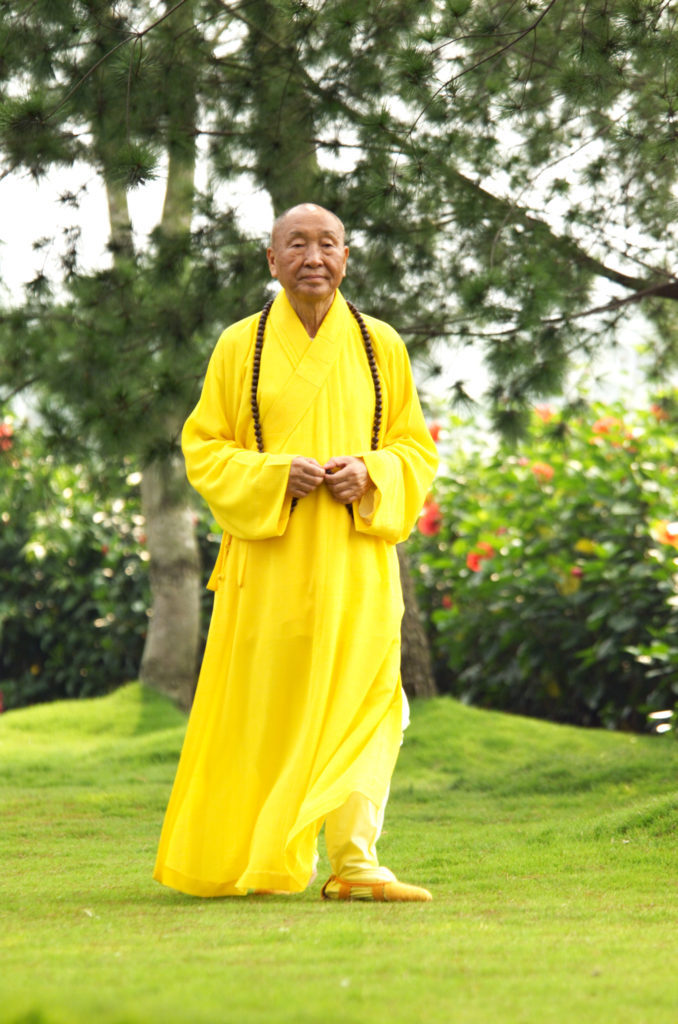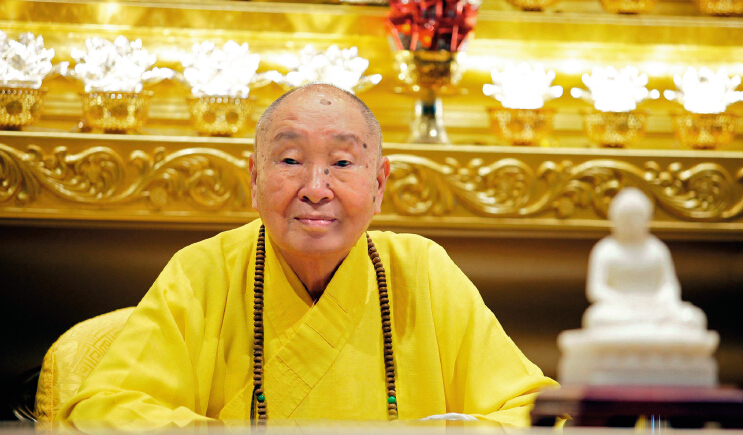

In today’s society, it is important to understand the meaning of “freedom.” If our perception of “freedom” is not correct, our thoughts and actions will easily be inappropriate. Some people think freedom means being uninhibited – eating when they want to eat, playing when they want to play, and doing whatever they wish. Actually, this is indulging in unrestrained thoughts and actions, creating bad karma, and sometimes even breaking the law and going to prison.
Having this attitude towards freedom is to misunderstand the true meaning of life. Constantly seeking material things, indulging in food, drink, and sensual pleasures, thinking that life is to enjoy oneself to the utmost—this is the freedom of the ignorant. Another attitude is “a reluctance to lift one finger to benefit the world.” Only seeking pleasures for oneself, and not caring the least about others, unwilling to do any good deeds, yet willing to spend millions on carnal pleasures, live extravagantly, and think this is freedom. Actually, this is to be selfish and to indulge oneself. It is not true freedom.
Buddhism teaches true freedom is not the freedom of the ignorant, not the freedom of indulgence. It is the freedom of the six roots, six senses—eye, ear, nose, tongue, body, and mind — as well as the purity of physical, verbal, and mental karma. For example, when our eyes see pleasant situations, we know they are good, but we do not give rise to attachments and craving. In turn, when we see unpleasant situations, we know they are bad; but we do not give rise to vexations. This “mind that knows” is neither defiled nor turned by external situations. “Skillfully discern the attributes of all phenomena while abiding firmly in the ultimate truth.” When we can distinguish all characteristics of phenomena and can clearly discern whether they are right or wrong, good or evil, that is “knowing.” When this “mind that knows” neither grasps nor rejects right or wrong, good or evil; when the six roots are not contaminated by the six dusts, when we always have clear understanding, the mind of wisdom manifests. Then, all our actions—walking, staying, sitting, or lying down—are appropriate. This is true freedom.
Discipline the Body, Speech, and Mind; the Mind is Unmoved by External Circumstances
If we wish to attain true freedom, we must discipline the body and mind. The body should be relaxed, but not indulgent; the mind should be at ease, calm, and peaceful – not giving rise to delusive thoughts, but maintaining stillness, and focus. The 心經 says Bodhisattva Avalokistevara attained freedom through contemplation. To “contemplate” means to reflect. To attain freedom of the body and mind, we should constantly we should constantly contemplate and reflect inwardly, maintain awareness in every thought, so that the karmas of body, speech and mind are pure. Then, our body, speech, and mind will be free.
What is freedom of Body?
How does the body attain freedom? The body karma must be pure. One should not kill, steal, or commit sexual offences. Buddhism teaches that “walking, sitting, and lying down” should be in accord with the four proper deportments: “walk like the wind, stand like the pine, sit like a bell, and sleep like a bow.” We should develop good habits in our daily life and observe the four proper deportments, then we will attain freedom in all our actions. Besides achieving purity of the body, we must also cultivate samadhi. By achieving samadhi, our body will be free from obstructions and we will be free from the suffering of old age, sickness, and death. Cultivating in stillness, we also fortify our practice through action and achieve freedom in both stillness and action. The body can then truly be free.
What is freedom of speech?
To attain purity of speech, we must not commit the four offences of malicious speech, cursing, lying, and frivolous speech. All our speech should be words of praise, words that benefit others. Then our speech can achieve freedom.
How can the mind achieve freedom?
People often cannot be masters of their own mind. When they see something pleasant, they give rise to greed and wish to have another look at it; when they hear pleasant sounds, the ear cannot help but listen to them a bit longer; when they sit in meditation, they feel bored, constantly give rise to delusive thoughts, thinking of the past, the present, and the future, with thoughts flowing continuously—that is not freedom. When we are masters of our mind, if we wish to think, we can think; if we wish to stop our thoughts, we can stop them; if we wish to do something, we can do it; if we do not wish to do something, we won’t do it. “Wherever you are, that is where the mind is.” This is self-mastery; this is freedom.
With Precepts as the Foundation; Every Thought is Free From Attachment
If we wish to transcend the mundane and achieve sainthood, attaining the same pure and free state as that of the bodhisattva, we must begin by establishing a flawless character. If we live a life of indulgence and indolence, and our character is flawed, how can we attain sainthood or buddhahood? Our mind cannot be free because it is always filled with delusive thoughts, drowsiness, boredom, and all kinds of vexations and obstructions; therefore, we cannot master ourselves. If we wish to achieve freedom, we must begin by making an effort in our daily life. “A tall building of ten thousand feet begins from the ground.” To build a tall building, the foundation must be solid and firm. Like a building, our life should also be based on a firm foundation. When the foundation is firm, one’s character is perfected.
Buddhism teaches the foundation of our life should be, first, to take refuge in the Three Jewels: to take the Buddha, the Dharma, and the Sangha as our teachers. Just as in studying or learning worldly skills, we must first look for a teacher, so that we do not take the wrong – or long – road. After we take the three refuges, we should take the five precepts of no killing, no stealing, no sexual misconduct, no lying, and no intoxicants. When we observe the pure precepts, and our character is completed, we will have a compassionate mind; a mind of equality, a mind of respect; a mind of wisdom. We can contribute our knowledge to society; this is the bodhisattva way, and we can accomplish anything.
Cultivating the way is to correct our wrong actions and wrong thoughts. Buddhism teaches us to “turn the unfamiliar to the familiar; turn the familiar to the unfamiliar.” We should care for others with a compassionate mind. Turn the original unfamiliar good deeds into the familiar, and turn the original familiar bad deeds into the unfamiliar, until both body and mind are refreshed and free. For example, some people have formed the habit of smoking, and feel very uncomfortable when the craving arises—this is the familiar. If we know smoking is not beneficial to our health and gradually curb this bad habit, this is to turn the familiar to the unfamiliar. Eventually one completely overcomes this habit and, consequently, will never suffer from it. We should contemplate and cultivate the unfamiliar good habits, work hard to detect them, remind ourselves to neither crave for pleasant situations, nor be vexed by unpleasant situations, never give up benefiting sentient beings, and never do anything to harm them.
If we wish to achieve freedom of mind, we must not give rise to bad thoughts and only give rise to good thoughts. As we give rise to good thoughts, we must take a step further by not clinging to good thoughts, until we finally arrive at no-thought. “No-thought” means this mind does not give rise to delusive thoughts. When facing any situation, it is unmoved and does not cling; it does not abide in the past, the present, or the future; awareness constantly manifests, and every thought is perfectly clear. This mind neither comes nor goes; it can transcend time and space; it can even transcend birth and death. When this mind attains the state of perfect clarity, that is infinite light and infinite life; that is the Tathagata.
The Tathagata is this mind that has no delusive thoughts or drowsiness; it is always master of itself; it is perfectly still, and always knowing. This is “When the One Vehicle is employed freely, all virtues are perfected.” This is the Tathagata’s state of freedom. This is the ultimate state. Most people live in a dualistic world, attached to brightness and darkness, stillness and motion, good and evil, beauty and ugliness. If we wish to improve ourselves, we must skillfully exercise this mind, be fortified by external situations, shatter our ego-attachment and discriminations, and turn duality to the absolute.
When this mind has no delusive thoughts or drowsiness, can achieve mastery everywhere, and attain the absolute state of total stillness, our life will be infinite—that is our true life. To attain this, we must work hard in our daily lives from the fundamental cause, the causal ground. In our personal and professional life, we must not violate moral principles. When our skills are perfected, our eyes, ears, nose, tongue, body, and mind will no longer cling to situations, or be confused — the six roots will be purified. We will be the masters of ourselves everywhere. ☸︎
From Chung Tai Magazine Issue 97

